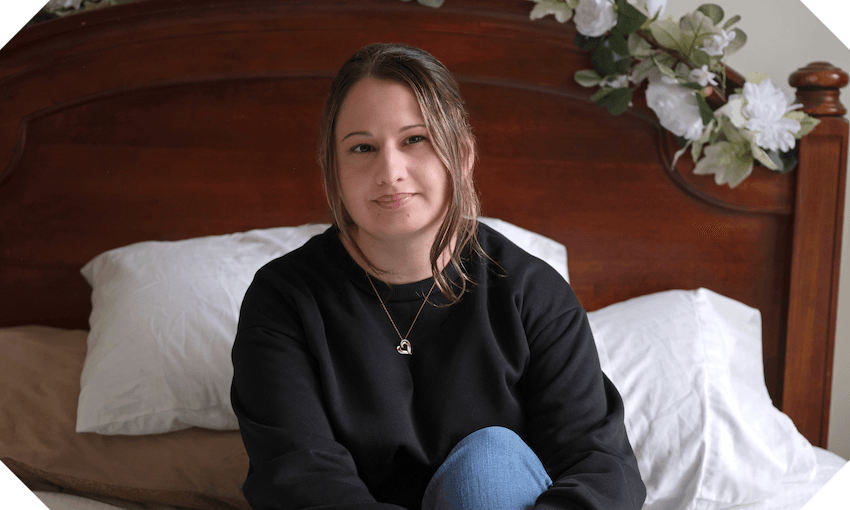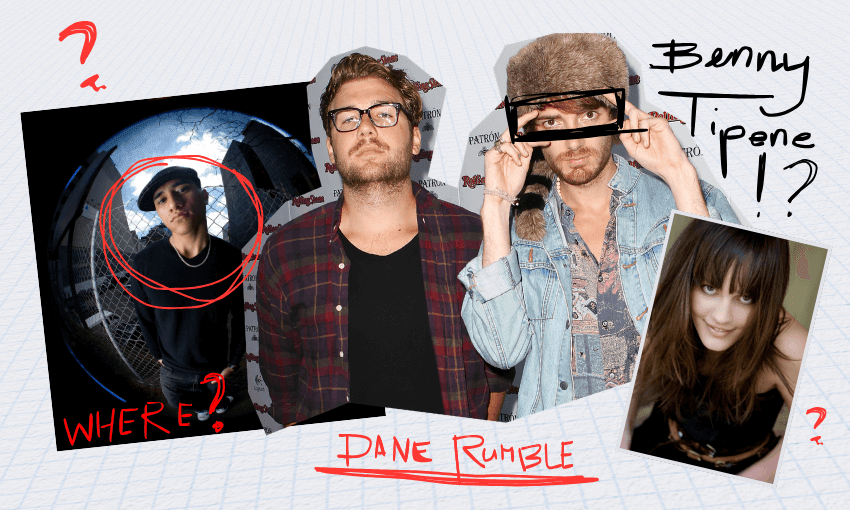Gypsy Rose Blanchard talks about the failures of the prison system, becoming a mother with the entire world watching, and returning to a normal life in infamy.
In the first episode of Gypsy Rose: Life After Lockup, Gypsy and her then-husband Ryan are being followed by a couple of persistent paparazzi as they attempt to leave a shoe shop, just nine hours after her release from prison. “How was your first shopping trip Gypsy?” one of them asks. “Any plans?” asks another. Within minutes, the photographs and videos they take will be all over the internet – this is the first public sighting of Blanchard since she went to prison in 2016.
It was a truly shocking series of events that led to Gypsy Rose Blanchard becoming a household name. A victim of Munchausen syndrome by proxy, Gypsy was forced by her mother Dee Dee to have unnecessary surgeries and take medications she didn’t need, use a wheelchair and shave her head for over two decades. The abuse culminated in Gypsy pleading guilty to second-degree murder of her mother, a crime which saw her imprisoned in Missouri for eight years.
The harrowing chapter quickly was quickly immortalised in several true crime documentaries as well as drama series The Act. Following her release from prison at the end of 2023, Gypsy Rose invited cameras to follow her re-entry into society in Gypsy Rose: Life After Lock Up. Whether navigating her IRL relationship with her penpal-turned-husband, or being followed by paparazzi into her family home, it’s full of fascinating and uncomfortable insights from a life in the eye of a truly singular storm.
With a few caveats around topics we couldn’t talk about (take a wild guess) and some customary opening small talk about New Zealand and Lord of the Rings (Gypsy is a big fan), here is our conversation about leaving the prison system, becoming a mother with the entire world watching, and returning to everyday life in infamy.
For the people that would say “why would I ever watch a TV show about her?” – what would you tell them about who Gypsy Rose is now, versus the Gypsy Rose they know?
The reason for doing the show was to show people that even I am tired of this prison version of myself that everybody had been seeing for years. I wanted to break the mould of what people saw when they thought of me. I think by showing people that I’m human, and that my past does not define who I am now as an individual, I’m going to break away from those prison images and move into something a little different.
These last six months have been a growth period for me. On the show, you see that everything is an adjustment for me. The emotion is so raw in the show, because I was able to be so comfortable with the crew. I was able to be vulnerable in my emotions and let that show on screen. I think that is something that people are going to associate me with – a sense of just being normal human with those normal human emotions.
How do you feel about all of those raw emotions being captured on camera, especially the more difficult parts of your relationship with [ex-husband] Ryan?
It’s hard, because there’s always been this love-hate relationship with the media for me. The love part of it is showing me in my truest form. And the hate part is definitely whenever someone wants to mischaracterise me. Having all of this play out on camera, at least I can look back on it. I’ve seen this the entire show, and I can pinpoint certain points where I’ve since gained a different perspective on my behaviour or a situation that took place. The benefit of it is that hindsight – except it’s not just 20/20, it’s also on your TV.
Most people don’t have these emotions play out in such a public forum though. Is there any part of you that just wants to be left alone by the cameras, and by people like me?
Thankfully, everybody has been so nice to me. I have not run into anybody on the street, or in person, or on Zoom, where the interaction has been negative. The fact that everybody’s been nice has made it a positive experience. It’s the negative comments from trolls on social media that’s the hard part.
You left social media at the start of the year and have since returned – how are you coping with being back online?
It was a much-needed break. Since then I’ve picked up a couple of better coping skills to tackle social media, because it really is such a horrible world that you have to have very thick skin to navigate. I am just as human as the next person the majority of the time, so I try to ignore it. But every once in a while, there’s that one comment that I do get wrapped up in and reply to. Thankfully, I have my family to fall back on, so we all talk about it, and we go from there. For the most part, I try not to look at the comments too much.
Outside of social media, there’s so much media out there about you that is totally out of your control. How do you feel about shows like The Act?
I still haven’t seen The Act all the way through. I’ve seen 30 minutes of the first episode. It’s really hard, because this was my life, so watching people recreate things that I went through is really hard to watch. Of course, you can always be over-critical of the acting or of certain things that didn’t ever take place, so I just try not to watch too much of that stuff. I just stick to documentaries that I know I participated in and that I feel do my story justice.
Aside from all this media attention, what has been the most surprising thing about returning to everyday life for you?
Time stopped when I went into prison. So the technology, the language, the slang that people use, everybody progressed over the last eight and a half years, and I stayed the same. Coming out to a whole new world where the teenagers have different slang, I didn’t know what a lot of it meant. I still say “cool”, you know, it’s like I’m still stuck in the 2000s. The phones are different, the cars are different. It’s like you step into the future, it’s a real adjustment.
I saw you just last week on The Kardashians. What was it like entering that kind of crazy media machine?
It was really nice to meet Kim. She’s very down to earth, and I was really surprised by that. She’s so famous, so of course I was a little nervous. But we sat down, we talked about prison reform, we talked about my experience in prison and the things that I would like to have change happen within the prison system. She is such an advocate for prison reform, and that’s an area in which I want to sort of break into. So getting to sit down with her and getting a few ideas to bounce around with her was really, really good.
What are your current plans for that advocacy work? Is there something specific that you are looking into when it comes to prison reform?
Hopefully I can get involved with certain agencies like The Innocence Project. There’s all these different people that come together collectively to sit down and figure out what the flaws are and what laws need to be changed. Of course, I’m not a lawyer. I don’t know much about that stuff, but getting involved with the right kind of people is the first step.
And from your first-hand experience, what are those flaws in the system that you encountered?
I feel like there is not enough emphasis and help towards mental health therapy. When I was in prison, I was not treated as if I was a person that went through trauma. They said that I was not that bad. When I saw the parole board they asked me, “how are you doing? Are you in any kind of therapy?” And I was like, “with respect, your facility turned me down for mental health therapy”. I absolutely needed therapy, I don’t think people should be categorised like I was. If someone went through trauma, they should have therapy to work on that trauma.
Is that trauma something that you’re working through now, do you have access to those sorts of resources?
Yes, I’m in therapy, and it’s going really well. I give my therapist all the pats on the back for listening to everything that I have to offload.
Also, congratulations on your recent pregnancy announcement – how are you feeling at the moment?
So far that this pregnancy has been a breeze. I bypassed all of the morning sickness, so I didn’t experience that, but the fatigue is kicking my butt. But it’s been a really good pregnancy so far, and we’re just hopeful for what the future has in store.
How do you feel about becoming a mother yourself, especially with all the attention that will be on you?
I’ve entered into a more protective mindset. I’m honestly much more self aware about what it means – not only for me, but for my family and my future family with my child. What will my level of interaction with the media be? How will that play a part in this new role as a mother? Those are all things that I am taking very seriously. I always get asked, “how do you feel about being a mother when you didn’t have such a great role model in your own mother?” For me, I’ve learned what not to do. Growing up with a mom that was, you know, not the best, I have seen what a good mom is in my stepmom. I call Kristy the mother I always wish I had. People like her and my dad are great role models to support and guide me on this journey.
Am I also right in thinking that it is your first birthday out of prison this weekend?
Yes, Saturday is my birthday, I’m turning 33.
What are your big birthday plans?
I know that I’m gonna have dinner with Ken [boyfriend, baby daddy] and my dad and my sister and Kristy and maybe my brother. I think they have got some plans for my birthday, but it’s going to be a surprise. I might go see a movie. If it’s still going at theatres, I definitely want to go see the newest Planet of the Apes movie.



